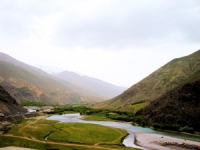Water sharing between Central Asian countries has been conflicting for quite a long time already.
Policy Dialogue
NATO Advanced Research Workshop "From Joint Scientific Research to Sustainable Regional Cooperation on Water"
NATO Advanced Research Workshop summary
On 29-30 June 2011, the EWI-Brussels office hosted a NATO Advanced Research Workshop “From Joint Scientific Research to Sustainable Regional Cooperation on Water”, organized by Dr. Kai Wegerich (IWMI-Central Asia Office), Mr. Sayed Shobair (Water Expert, Afghanistan), the Amu Darya Basin Network (ADBN) Secretariat, and sponsored by the NATO Science for Peace and Security Programme. The objective of the NATO Advanced Research Workshop was to highlight current ongoing cooperation efforts between the riparian states in the Amu Darya basin. Experts from Afghanistan, Tajikistan, Turkmenistan, Uzbekistan, as well as international experts from IWMI, GIZ, Pyandj River Basin Program, UNEP, Council of the European Union, NATO, Leuphana Universität Lüneburg (Germany), and Wageningen University (the Netherlands) presented their papers on joint research and data generation, governance, bi-lateral cooperation and sharing of transboundary infrastructure, education and networking initiatives in the region.
Among the topics discussed were:
- The NATO Science for Peace and Security Programme and its activities (Dr. Deniz Beten, Senior SPS & Partnership Cooperation Advisor, NATO)
- Presentation of the “Environment and Security in the Amu Darya River Basin” report (Ms. Laura Rio, UNEP Regional Office for Europe)
- Ongoing cooperation between Turkmenistan and Uzbekistan on sharing of transboundary infrastructure (Mrs. Guljamal Nurmuhammedova, Independent Expert, Turkmenistan)
- Water gauging stations in upstream Tajikistan (Dr. Inom Normatov, Institute of Water Problems, Hydropower and Ecology, Tajikistan and Dr. Oliver Olsson, Leuphana Universität Lüneburg, Germany)
- Amu Darya as the main water source for generation of hydro-power and irrigation between Afghanistan and Tajikistan (Dr. Mohammad Hassan Hamid and Dr. Mohammad Qesim Sediqy, Kabul Polytechnic University, Afghanistan
- Problem of being a late developer in the Amu Darya Basin (Dr. Kai Wegerich, IWMI Central Asia and Dr. Oliver Olsson, Leuphana Universität Lüneburg, Germany)
- European Policy on water issues in Central Asia (Dr. Jenniver Sehring, Council of the European Union)
- Water governance on tributaries within Afghanistan (Mr. Jelle Beekma, Panj-Amu River Basin Programme)
- Water cooperation on small transboundary rivers in Central Asia: the case of Murgab and Isfara River (Dr. Iskandar Abudllaev, Transboundary Water Management in Central Asia, GIZ)
- Water governance on transboundary tributaries on the northern side of Tajikistan (Dr. Jusipbek Kazbekov, IWMI Central Asia)
- Educational cooperation within the Amu Darya / Central Asia (Mrs. Ewa Wietsma, Wageningen University, the Netherlands)
- Amu Darya Basin Network: history and way forward (H.E. Ambassador Guenter Overfeld, EastWest Institute)
The workshop highlighted that efficient transboundary cooperation in the Amu Darya Basin is possible, against the belief that water cooperation in the Amu Darya Basin is stagnant and a politically unfavorable. Success stories exist to demonstrate the particularities of building successful transboundary water cooperation. Important conditions for effective cooperation lie in clearly identified common interests, continuous consultations and dialogue (both formal and informal), bottom-up approach, public participation, and ownership of the process. Of course, every case has specific needs and requirements for success. Therefore, no blueprint for building cooperation could work. This highlights the importance of sharing experiences and lessons learned.




